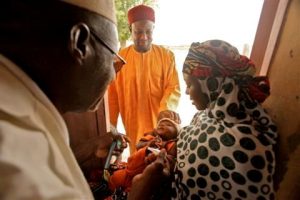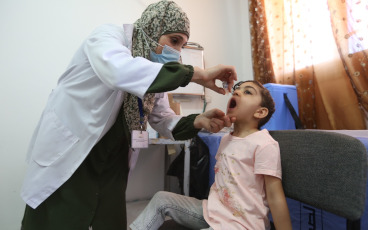Getting the “Last Hair” in Nigeria
The Hausa people have a saying: When you shave a man’s head, it is getting the last hair that is the most difficult. So it is with eradicating polio.

A health worker visits a house and vaccinates an infant. During supplementary immunization activities, health workers walk from house to house, vaccinating every child under five.
Tom Moran/WHO
Dr Muhammad Pate, Executive Director of Nigeria’s National Primary Healthcare Development Agency, blogs about his country’s fight against polio.
In Nigeria we have made remarkable progress in the fight against polio, with campaigns that drove polio down from 388 cases in 2009 to 21 in 2010—a 95 percent reduction. We are extremely hopeful these gains continue and we know much hard work remains.
This progress is largely due to the immense momentum of our polio campaign. It has demonstrated that immunizations are safe, cost-effective tools to prevent infectious diseases and ultimately save children’s lives. The number of parents who refuse immunizations is falling because parents and traditional leaders have witnessed the effectiveness of oral polio vaccines to protect their children from paralysis and death.
The polio program has provided the momentum to combat other vaccine-preventable diseases like measles, which cost us our children’s lives as well.
In January 2011, Nigeria launched a major campaign to administer both measles and polio vaccines to 31 million children under the age of five—thereby protecting children from two diseases. And during an upcoming national campaign later this month, health workers at fixed posts around the country will offer children doses of oral polio vaccines—along with an integrated package of other health interventions, including Vitamin A, deworming tablets and other routine immunizations.
From this broad perspective, conquering polio has an impact far beyond the immediate benefits of eradication. Perhaps polio eradication’s most enduring legacy will be that it lays the groundwork for countries like Nigeria to defeat other childhood diseases.
Still, there is significant work to be done. As long as polio exists in Nigeria, it can exist anywhere. To finally finish the job, we must maintain the momentum for mass immunization campaigns. Once Nigeria and the world win the fight against polio, it will inspire us to continue to tackle other pressing health challenges.
The Hausa people, who live in northern Nigeria, have a saying: When you shave a man’s head, it is getting the last hair that is the most difficult.
Similarly, the final chapter of polio eradication – in Nigeria and globally—will require even more effort than the previous ones. When we work tirelessly to ensure that our momentum is sustained we get closer to finishing the job on polio and building upon that success to protect children from other deadly diseases as well.
Watch the full video – Ending Polio: Building on the momentum












